Before She Died, Rocky Dennis’s Mom FINALLY Broke Silence About Rocky Dennis And It’s Not Good | HO!!

For decades, the world believed it knew the story of Rocky Dennis—a boy whose rare bone disorder made him a medical marvel, an inspiration, and ultimately, the subject of a Hollywood film. But as the years passed and the legend grew, the truth of Rocky’s life remained hidden beneath layers of myth, sanitized for public consumption.
Before her death, Rocky’s mother, Florence “Rusty” Dennis, finally broke her silence. Her confession, raw and unflinching, upends the comforting narrative that captivated millions and forces us to confront the harsh reality behind the mask.
The Making of a Miracle
Born Roy L. “Rocky” Dennis in 1961, Rocky’s arrival in California seemed ordinary. He weighed a healthy seven pounds, showing no sign of the rare genetic disorder that would later define—and confine—his life. For his first two years, Rocky was a happy, energetic child.
But then came the ear infections, the sinus problems, the sore throats. Concerned, Rusty took him for x-rays. What doctors at UCLA found was shocking: Rocky’s skull was thickening at an alarming rate, distorting his features and threatening his brain.
The diagnosis was cranio-diaphyseal dysplasia, a condition so rare it was nicknamed “lionitis.” Calcium built up in Rocky’s bones, turning his skull into a prison. Doctors told Rusty to prepare for the worst. Her son would lose his sight, his hearing, and ultimately, his life—likely before his seventh birthday. The prognosis was terminal. The future, they said, held only decline.
Defying the Odds—And the Narrative
But Rusty was nothing if not defiant. She refused to let Rocky’s life be measured in losses. Against medical advice, she enrolled him in public school. Teachers and administrators objected, worried his appearance would disturb other children. But Rocky thrived. His test scores were strong, his curiosity boundless, and his sense of humor infectious. He was a child first, a patient second.
Music became Rocky’s escape. He plastered his bedroom with Bruce Springsteen posters and played “Born to Run” on repeat. Summer camps for children with disabilities became his sanctuary, where he was voted “friendliest camper” and “best buddy.” For a few weeks each year, he was just another kid.
Behind the resilience, though, was suffering. Rocky’s life was a cycle of doctor visits, eye exams, and the looming threat of blindness. The world celebrated his courage, but few saw the pain behind the smile.
The House That Chaos Built
Hollywood would later paint Rusty as a colorful but devoted mother, fiercely protective of her son. The truth, as she later admitted, was more complicated. Their home was chaotic—a revolving door of bikers, parties, drugs, and brushes with the law. Rusty battled addiction and instability. Love was never in short supply, but neither was volatility.
Rocky’s childhood was shaped by contradiction: laughter in the living room, shouting in the kitchen. He learned to find strength in the tension between affection and disorder. His humor became his armor. On Halloween, he would pull off a store-bought mask to reveal his real face, turning shock into laughter. He rejected cosmetic surgery, insisting his unique features belonged to him alone.
The Decline—and the Hollywood Rewrite
By 1978, Rocky’s condition was worsening. Headaches became constant, his energy faded, and he withdrew from friends. On October 4, 1978, Rocky died in his bed at 16. There was no cinematic farewell, no mother holding her son as he slipped away. Rusty was absent, pulled from home by legal troubles. She learned of his death by phone.
Seven years later, Hollywood seized the story. In 1985, director Peter Bogdanovich’s film “Mask,” starring Eric Stoltz and Cher, turned Rocky into a symbol of hope. The movie was a critical and commercial success, winning awards and cementing Rocky’s place in American pop culture. But the film was a sanitized version of reality.
Rocky’s half-brother Joshua was erased from the narrative. The funeral scene was fictionalized, the chaos of Rusty’s real life replaced by a softened, sympathetic portrait.
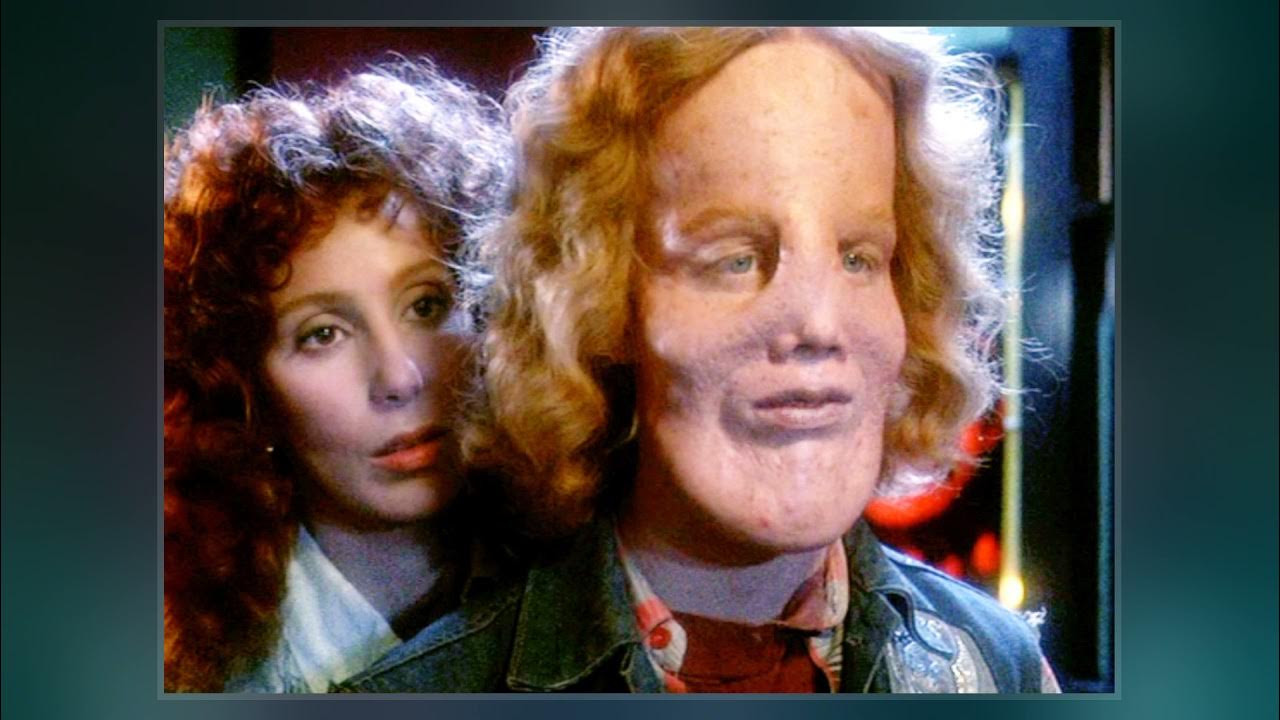
The Growing Myth
After “Mask,” Rocky Dennis became more than a boy—he became a legend. Schools told his story to inspire students. Parents of children with disabilities pointed to him as proof that adversity could be overcome. The media embraced him as the boy who defied doctors, who faced ridicule with a smile.
Rusty rarely challenged the film’s portrayal. She allowed the myth to flourish, perhaps because it gave her son’s life meaning, perhaps because it was easier than the truth. But with each retelling, the real Rocky faded. His flaws, frustrations, and the chaos of his upbringing were buried beneath the legend.
The Mother’s Confession
As Rusty aged, the silence became suffocating. The legend of Rocky uplifted strangers but left her hollow. In her final years, she began to speak out, granting interviews and sharing the truth she had long kept hidden.
Her confession was devastating. Rocky was not perfect, she admitted, and neither was she. The film’s tender death scene was a lie. “My baby was not in my arms when he died,” Rusty revealed. She was not there for his final moments.
Rocky was not buried in a flower-strewn cemetery; his body was donated to UCLA for medical research. His bones became teaching tools, his case cited in journals, his legacy living on in laboratories and lecture halls.
The Truth Behind the Mask
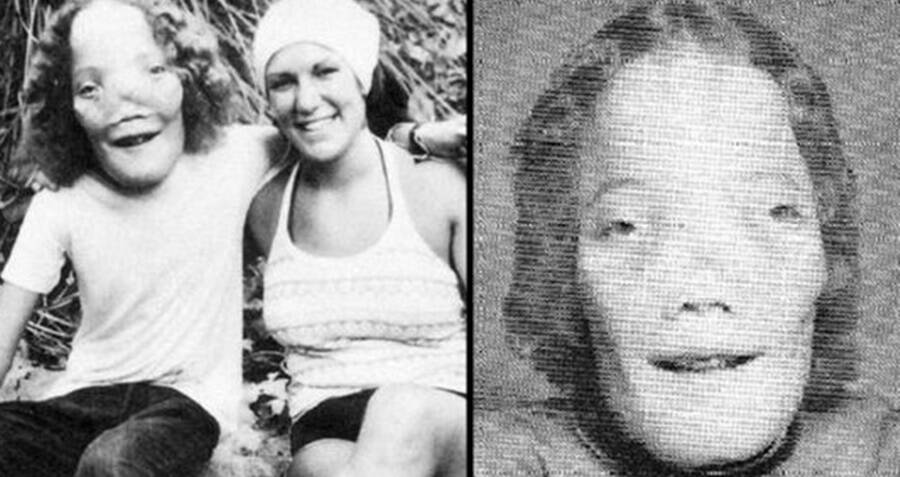
Rusty’s confession dismantled the myth with brutal honesty. Rocky was not a miracle boy, not a flawless inspiration. He was a teenager—brilliant, funny, and deeply human. He suffered. He endured. Hollywood had polished away his contradictions, turning him into a marketable symbol of hope. But the reality was messy and raw.
Rusty’s final words were not designed to comfort. They were a reminder that behind every legend is a truth too complicated for the world to want, but too important to ignore. Rocky’s story was not about conquering fate, but about living with pain, chaos, and love—about being human.
The Legacy Reconsidered
Today, Rocky Dennis is remembered as a cultural icon. But the real legacy, as his mother revealed, is more complicated. Do we honor the myth that inspired millions, or the reality that was too harsh for Hollywood?
Rusty Dennis’s confession forces us to reconsider what we think we know about courage, suffering, and the stories we choose to tell. Behind the mask, there was a boy—imperfect, enduring, and real. And maybe, in the end, that is the story that matters most.
News
Avengers Cast QUITS – Marvel Halts All Future Films After Ironheart Backlash | HO~
Avengers Cast QUITS – Marvel Halts All Future Films After Ironheart Backlash | HO~ In a stunning turn that has…
Stephen Colbert And Jimmy Fallon Send A Chilling Message To Nexstar And Sinclair | HO~
Stephen Colbert And Jimmy Fallon Send A Chilling Message To Nexstar And Sinclair | HO~ In a week that will…
At 92, Shirley Jones Finally Exposed The Truth About Her Marriage To Jack Cassidy | HO!!!!
At 92, Shirley Jones Finally Exposed The Truth About Her Marriage To Jack Cassidy | HO!!!! For decades, Shirley Jones…
CT Scans Finally Solves Ancient Vampire Skeletons Mystery and Exposes a Dark Secret | HO!!
CT Scans Finally Solves Ancient Vampire Skeletons Mystery and Exposes a Dark Secret | HO!! When archaeologists began excavating the…
DNA of Queen Nefertiti Is Finally Analyzed, And It Revealed Something Terrifying About Her Death | HO!!
DNA of Queen Nefertiti Is Finally Analyzed, And It Revealed Something Terrifying About Her Death | HO!! Cairo, Egypt —…
Army Nurse Suddenly Vanishes in 1942, 40 Years Later, Scientists Make a Chilling Discovery… | HO!!!!
Army Nurse Suddenly Vanishes in 1942, 40 Years Later, Scientists Make a Chilling Discovery… | HO!!!! In the summer of…
End of content
No more pages to load


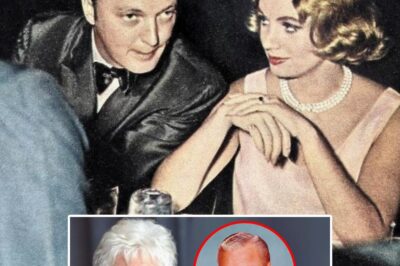
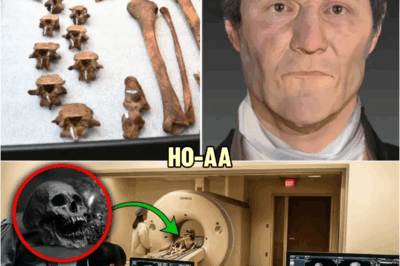
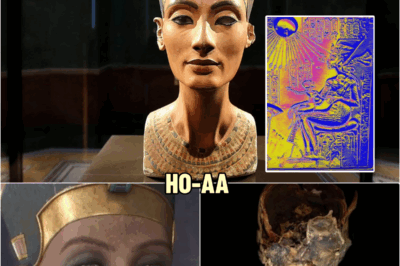

Leave a Reply